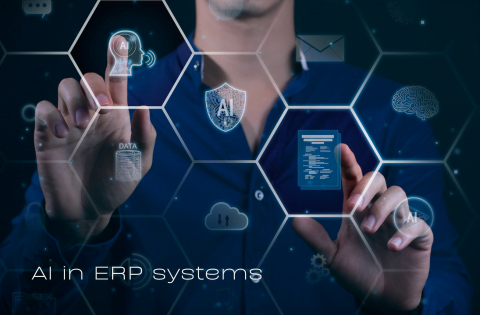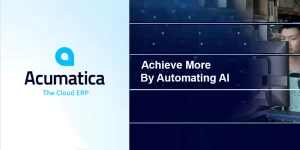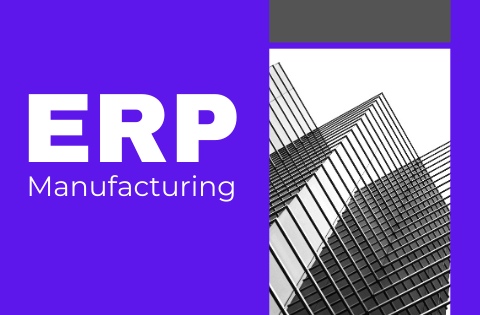Best AI Powered ERP Software Systems for Enterprises

Today AI ERP software can understand, analyze, and report any discrepancies in advance from various data source points for your business.
This is only possible due to embedded AI and machine learning capabilities integrated with ERP systems.
The use of AI in ERP Systems is still in its early stages, but major ERP vendors have already implemented most of AI’s capabilities into their ERP.
As a result, today industry CEOs are researching more about AI-powered ERP to drive innovations from AI ERP systems and implement them for their business growth.
AI ERP usually identifies patterns and makes predictions to help organizations make informed decisions based on accurate business data.
Therefore these systems usually automate repetitive tasks and help your business gain insights from existing data.
Features such as virtual assistants, chatbots, and voice recognition are also integrated with AI ERP software to streamline the user experience.
Therefore, several components of the system allow employees to access ERP software seamlessly.
What exactly is AI ERP software?
AI ERP (Artificial Intelligence Enterprise Resource Planning) software is like a super-smart business assistant that combines the power of a comprehensive management system (ERP) with the intelligence of artificial intelligence (AI).
AI ERP (Enterprise Resource Planning) software combines the power of Artificial Intelligence (AI) with traditional ERP systems or cloud ERP software to enhance their functionality and efficiency.
ERP systems usually manage core business processes like finance, sales, HR, procurement, manufacturing, maintenance, quality, and more.
So integrating AI into ERP software brings intelligent automation to these systems, improved data analysis, and decision-making capabilities to streamline operations and drive better business outcomes by reducing operational costs.
AI ERP Software & System Functionalities
AI is more likely to automate your business and here are some of the functionalities of AI ERP systems.
a) Data Processing and Automation:
AI ERP software excels in data processing and automation; its algorithms can process large volumes of data quickly and accurately, reducing manual data entry and errors.
For example, in an HR module, AI can automate resume screening by parsing and categorizing applicant information, helping HR teams identify suitable candidates faster.
b) Predictive Analytics:
In the realm of AI ERP (Artificial Intelligence Enterprise Resource Planning) software, predictive analytics stands as a formidable tool.
Predictive analytics in ERP is the use of data analysis to predict future events or trends.
For example, in supply chain management, AI can forecast demand for products based on historical sales data, ensuring optimal inventory levels.
c) Natural Language Processing (NLP):
NLP usually enables AI to understand and respond to the natural human language, improving communication and interaction.
It goes beyond mere language understanding and empowers AI ERP to extract nuanced insights from unstructured textual data.
For example, AI-powered chatbots integrated into customer service modules can answer queries and resolve issues 24/7.
d) Personalized User Experience using AI ERP Software:
AI can tailor user interfaces and recommendations based on individual preferences and behaviours.
AI goes beyond basic product suggestions as in the context of ERP software, it can recommend specific actions and workflows based on a user’s historical interactions and current context.
For example in e-commerce, AI suggests products to customers based on their past purchases and browsing history.
e) Predictive Maintenance:
AI analyzes equipment data to predict when machinery or assets need maintenance, reducing downtime.
For instance, in a manufacturing setting, AI can predict that a specific machine’s motor is likely to overheat and fail in the coming weeks due to wear and tear, allowing for proactive maintenance.
It can recommend the specific steps and resources required to address an issue, such as suggesting the replacement of a worn-out component or scheduling maintenance during a downtime window that minimally impacts production.
f) Fraud Detection:
AI algorithms can identify unusual patterns in financial transactions to detect fraudulent activities.
For instance, they can detect unusual purchasing behaviour or discrepancies in vendor invoices by learning from historical data and recognizing deviations.
In financial modules, AI can flag suspicious transactions in your business for further investigation.
g) Cognitive Insights:
AI generates insights from unstructured data sources like customer reviews or social media.
AI not only detects sentiments but also automatically generates insightful reports or summaries that highlight key trends and recommendations for campaign optimization.
For example in marketing, AI can analyze social media sentiment to gauge public opinion about a product or brand.
h) Workflow Optimization:
AI can optimize workflow processes by routing tasks, automating approvals, and ensuring tasks are completed efficiently.
For instance, in a manufacturing environment, AI can adjust production schedules and assign specific tasks to workers based on equipment availability and production demands.
Over time, AI ERP learns from your user’s interactions and workflow data, thus becoming better at optimizing processes.
i) Supply Chain Optimization:
AI enhances supply chain visibility, optimizing logistics, reducing costs, and forecasting demand with exceptional accuracy.
Therefore AI EPR helps to improve visibility across the supply chain.
For example, a global logistics company uses AI to optimize shipping routes, reducing fuel consumption and emissions.
j) Financial Forecasting:
AI ERP systems have the potential to improve financial forecasting significantly.
For instance, Small businesses leverage AI-enhanced ERP solutions to anticipate cash flow fluctuations.
They use a variety of data sources, including historical financial data, market trends, and economic indicators, to generate accurate and timely forecasts.
The 4 Best AI-Powered ERP Software for Enterprises
With increased interest in AI, businesses, and industries are actively looking for AI capabilities in their ERP.
However, there are only a limited number of ERP vendors who provide AI capabilities in their ERP products, and here are some of them:
1. FocusX: AI-Based Cloud ERP Software

Focus Softnet is an old player in the ERP market, however, FocusX is built with AI from the ground. It offers actionable insights and smart automation, predictive analysis and future proof planning, conversational interfaces and personalized workflows. All of it comes in an unified platform for enhanced efficiency, scalability and growth. From production to supply chain, customer relationship management to inventory and human resources FocusX ERP ensures an integrated ERP solution with embedded AI.
Key benefits of using FocusX AI ERP system:
- Composable architecture: FocusX boasts a “composable” architecture, meaning it’s built from independent microservices that can be easily added, removed, or replaced based on your specific needs
- Deep AI integration: AI is deeply embedded into its core functionalities offering predictive analytics to forecast future trends in your business.
- Data-driven focus: FocusX leverages AI tools to understand hidden patterns and insights in your data, empowering you to make informed business choices.
- Focus on agility and speed: This is achieved through automation, real-time data visibility, and streamlined workflows.
- Indian market focus: This provides specific compliance and understanding for Indian businesses.
Key Features of FocusX AI ERP
- Automated workflows: Automates routine tasks to improve efficiency and reduce errors.
- Demand forecasting: Predicts future demand for products, optimizing inventory management.
- Fraud detection: Identifies and flags suspicious activity to protect your business.
- Predictive maintenance: Analyzes equipment data to predict potential failures and schedule preventive maintenance.
- Chatbots and virtual assistants: Provides 24/7 customer support and answers basic inquiries.
- VUI processing: Generate reports with voice user interface processing
- Compliance management: Automates compliance tasks and ensures adherence to regulations.
Pros:
- Cloud-based & Latest Version
- Ease of use and customization
Cons:
- It’s still a relatively new player in AI
- Small user base compared to other established vendors
2. Acumatica xRP Platform: Best Cloud AI ERP

The Acumatica Cloud xRP platform offers AI capabilities and low-code/no-code customizations. The CRP platform of Acumatica ERP is based on cloud and mobile technology. It serves as an architectural framework empowering developers and businesses to customize applications according to their business requirements.
Key benefits of using the Acumatica xRP ERP system:
- Focus on automation: Acumatica offers robust automation capabilities powered by AI, including features like automatic invoice creation, bank reconciliation, and data entry.
- Industry-specific focus: This offers pre-built AI solutions tailored to your industry’s needs, unlike the generic solutions of some competitors.
- Open platform and customization: This provides deeper flexibility and control over your AI implementation compared to more rigid systems.
- Strong mobile capabilities: This prioritizes access to AI features on the go, unlike solutions lacking robust mobile apps.
- Focus on user experience: This ensures broader adoption and smoother integration of AI into your workflows.
- Integration with Acumatica ERP: It seamlessly integrates with all Acumatica ERP modules, allowing you to apply AI across your entire business operation.
- Embedded AI algorithms: Acumatica xRP comes with pre-built AI algorithms for various tasks like anomaly detection, fraud prevention, and predictive maintenance.
- Customizable AI development: The platform provides tools and APIs for developers to build custom AI models and applications tailored to your specific needs.
- Low-code/no-code development: Even without extensive programming knowledge, users can leverage pre-built AI components and workflows to automate tasks and gain insights from data through the platform’s visual development tools.
- Data science tools: If you have in-house data scientists or engineers they can use xRP tools to extract valuable insights and build advanced AI models.
Key Features of the Acumatica xRP Platform
- Natural language search: Users can search for data and information within Acumatica using natural language queries, simplifying analysis and data exploration.
- Guided workflows: AI-powered guided workflows assist users in completing complex tasks efficiently, even those unfamiliar with specific processes.
- General ledger anomaly prediction: Acumatica’s AI can analyze your financial data and predict potential anomalies, helping you identify and address fraudulent activities or accounting errors early on.
- Customizable dashboards and reports: Users can create personalized dashboards and reports with AI-powered insights and visualizations, gaining quick access to key performance indicators.
- Integrated CRM and marketing automation: Acumatica’s AI capabilities extend to its integrated CRM and marketing automation modules, offering features like lead scoring, personalized marketing campaigns, and intelligent chatbots.
Pros:
- Scalable SaaS offering along with built-in integration
- Enhanced Automation and Efficiency
Cons:
- Acumatica might require more technical expertise for customization
- Complexity
3. Epicor & AI

Epicor system integrates AI to provide enhanced productivity solutions tailored to various industries. This AI ERP platform transforms financial and operational data, enabling better forecasting accuracy, strategic planning, and data-driven decision-making. Epicor AI isn’t just a single feature; it’s a comprehensive suite of AI-powered tools designed to transform your operations. AI integration in Epicor is more than just a software upgrade; it’s a strategic investment in your business’s future. With its intelligent capabilities, you’ll gain a significant edge in today’s competitive landscape.
Key benefits of using Epicor AI ERP system
The AI features in Epicor ERP aren’t just bells and whistles; they offer tangible benefits for your business such as:
- Enhanced Efficiency: Epicor Agent automates tasks and simplifies information access, freeing up your team’s valuable time. AI@Work further streamlines processes, ensuring smooth operations.
- Improved Decision-Making: Predictive analytics equips you with data-driven insights to make informed choices. No more flying blind – you’ll have the power of AI to guide your strategic direction.
- Reduced Costs: By optimizing processes, minimizing errors, and anticipating problems, Epicor AI can significantly reduce your operational costs.
- Increased Productivity: Your team will be empowered to focus on higher-value tasks, leading to a surge in overall productivity.
- Predictive Analytics: Get a glimpse into the future! Epicor AI analyzes vast amounts of data to identify trends and predict potential issues from demand forecasting to preventative maintenance. By anticipating problems before they arise, you can minimize disruptions and optimize resource allocation. For Example, proactive part failure prediction and inventory optimization (especially valuable in automotive parts management
Key Features of the Epicor with AI Integration
The AI-infused components within Epicor ERP Software include:
- Epicor FP&A (Financial Planning & Analysis): Utilizes AI and ML to analyze diverse data sources, including ERP and SCM systems, to enhance predictive analysis and strategic planning.
- Epicor Automation Studio (AI@Work): This AI component powered by Workato interprets natural language requests to automate complex workflows, enhancing operational efficiency.
- Epicor IDC (Intelligent Data Capture): Utilizes AI-driven capabilities to scan, capture, and classify documents, reducing manual entry and improving data accuracy, thus saving time and enhancing operational efficiency.
- Epicor Agent: Built on Azure AI foundation with an interface to Azure OpenAI, it understands and responds to user queries through natural language processing, streamlining interactions and providing timely suggestions.
Pros:
- Increased efficiency and productivity through automation
- Improved decision-making with AI-powered insights
Cons:
- Potential upfront investment costs for implementing AI features
- Reliance on data quality for accurate AI predictions.
4. Microsoft Dynamic 365

When it comes to Microsoft ERP it talks about the 3 A’s of operational innovation i.e. artificial Intelligence, automation and analytics. Microsoft Dynamics 365 is a suite of ERP and CRM software that integrates AI, IoT, Mixed Reality and copilot capabilities across the platform to empower teams, close more deals, create personalized service experiences, move beyond traditional finance an deliver more supply chain agility using AI-powered insights and automation. By building a common data model it brings together operation and analytics data at one platform.
Key benefits of using Microsoft Dynamics 365 ERP system
- Automation with AI: Generative AI in Dynamics 365 Copilot automates repetitive tasks, freeing up human capital for strategic thinking.
- Streamlined workflows: Unified platform across departments eliminates data silos and improves collaboration.
- Real-time insights: Built-in analytics and AI provide actionable insights based on real-time data across your organization.
- Predictive capabilities: Leverage AI to forecast trends, identify potential issues, and make data-driven decisions.
- Cloud-based deployment: Easy to scale up or down as your business needs evolve, without significant IT infrastructure investment.
- Modular design: Implement only the modules you need now, with the flexibility to add more later.
- 360-degree customer view: Unify customer data across sales, marketing, and service for a more personalized customer experience.
- Improved forecasting: AI helps predict customer demand and optimize inventory management.
- Microsoft’s robust security infrastructure: Backed by Microsoft’s security expertise for data protection and regulatory compliance.
- Role-based access control: Granular control over user permissions ensures data access aligns with job functions.
Key Features of Microsoft Dynamic 365 AI ERP
- Dynamics 365 Copilot: It uses generative AI to automate tasks, reduces manual data entry, and improves user experience.
- AI-powered features in Finance, Project Operations, and Supply Chain Management: Streamlines financial processes, optimizes project scheduling, an improves inventory forecasting.
- Integration with Microsoft 365 and Power BI: Seamless data flow between applications you already use, simplifies reporting and data visualization.
- Hyper-personalized customer experiences: These personalized marketing campaigns, product recommendations, and customer service interactions are based on individual customer behavior and preferences.
Pros:
- Enhanced Intelligence with Microsoft Dynamics 365 Copilot
- Unified Platform for Improved Efficiency
Cons:
- Maybe Complex for some businesses
- Higher TCO with additional factors like user training, customizations, and maintenance
Conclusion:
An AI-powered ERP software is especially traditional ERP or cloud ERP with added artificial intelligence. This means repetitive tasks are automated, freeing up employees for strategic thinking. AI ERP software analyzes vast datasets to forecast demand, predict equipment failures, and optimize inventory levels. Moreover, it personalizes customer interactions, anticipates needs, and streamlines the sales process.
AI-powered ERP uses machine learning algorithms to improve the efficiency and effectiveness of your organization’s operations by surfacing hidden trends and patterns in your data, providing actionable insights for better decision-making across all your departments and anticipating and adapting to changing business conditions.
Chatbots, voice recognition, and virtual assistants are some of the common AI features which are available today in most AI-powered ERP systems. This makes it easier for employees to access and use the system, reducing the learning curve and improving user adoption.
Therefore AI ERP Software equips small businesses with the tools required to compete with larger companies and stay competitive in today’s dynamic business landscape.


